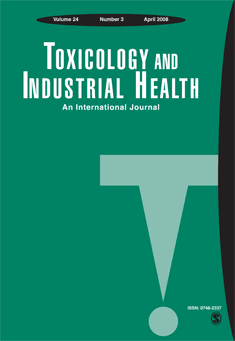
TOXICOLOGY AND INDUSTRIAL HEALTH
Scope & Guideline
Innovating solutions for a healthier industrial environment.
Introduction
Aims and Scopes
- Occupational Toxicology:
Research dedicated to understanding the health effects of chemical exposures in occupational settings, including the assessment of risk factors and the development of protective measures for workers. - Environmental Health:
Studies investigating the impact of environmental pollutants and chemicals on human health, with a focus on exposure pathways and biological effects. - Nanotoxicology:
Exploration of the toxicity associated with nanoparticles and nanomaterials, including their biological interactions and potential health risks. - Biomarkers of Exposure and Effect:
Identification and validation of biomarkers that indicate exposure to toxic substances and their effects on health, aiding in the monitoring of occupational and environmental risks. - Mechanistic Studies:
Research elucidating the biological mechanisms underlying toxicity, including oxidative stress, inflammation, and cellular apoptosis related to chemical exposure. - Risk Assessment and Management:
Development of methodologies for assessing health risks associated with chemical exposures, aimed at informing policy and regulatory frameworks.
Trending and Emerging
- Chemical Mixture Toxicity:
There is an increasing focus on the health effects of chemical mixtures, reflecting the complexity of real-world exposures and the need for comprehensive risk assessments. - Endocrine Disruption and Hormonal Effects:
Research on endocrine disruptors, particularly related to chemicals like bisphenol A and phthalates, is gaining traction due to heightened awareness of their impact on reproductive and developmental health. - Sustainable and Green Chemistry:
Emerging studies are looking at the health implications of sustainable practices and alternative chemicals in industry, aligning with global trends towards sustainability. - Longitudinal and Epidemiological Studies:
An increase in longitudinal studies and epidemiological research is evident, providing valuable insights into the long-term health effects of occupational exposures. - Psychosocial Factors in Occupational Health:
There is a growing interest in the interplay between psychosocial factors and toxic exposures, especially in relation to mental health outcomes among workers.
Declining or Waning
- Traditional Chemical Exposure Studies:
There has been a noticeable decrease in studies solely focused on traditional chemical exposure assessments without integrating newer methodologies or biomarkers, as the field moves toward more complex and multifaceted approaches. - Single-Agent Toxicity Testing:
Research concentrating on the effects of single agents is becoming less frequent, as there is a growing recognition of the need to study chemical mixtures and their combined effects on health. - Historical Occupational Studies:
Publications centered on historical data regarding occupational exposures are waning, possibly indicating a shift towards contemporary issues and current exposure scenarios. - Animal Models for Toxicity Testing:
The reliance on animal models for toxicity testing is declining as researchers increasingly advocate for alternative methods, including in vitro studies and computational models.
Similar Journals
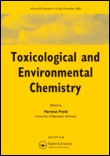
TOXICOLOGICAL AND ENVIRONMENTAL CHEMISTRY
Advancing knowledge at the crossroads of chemistry and health.TOXICOLOGICAL AND ENVIRONMENTAL CHEMISTRY is a pivotal journal published by Taylor & Francis Ltd, addressing critical intersections between environmental chemistry and toxicology since its inception in 1979. With its ISSN 0277-2248 and E-ISSN 1029-0486, the journal serves as a platform for rigorous research and innovative methodologies in pollution control, health implications of environmental chemicals, and the broader spectrum of toxicological studies. Although it currently does not offer open access, the journal's impact in the field is underscored by its Category Quartiles rankings in 2023, placing it in Q3 across Environmental Chemistry, Health, Toxicology and Mutagenesis, and Pollution categories. Furthermore, its Scopus rankings reveal its significant role within the scientific community, specifically in areas such as Environmental Science and Toxicology. The journal aspires to foster multidisciplinary dialogue and advance knowledge that contributes to environmental sustainability and public health, making it an essential resource for researchers, professionals, and students dedicated to these fields.
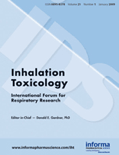
INHALATION TOXICOLOGY
Pioneering Insights into Airborne Exposures.Inhalation Toxicology, published by Taylor & Francis Ltd, is a premier journal dedicated to advancing the field of toxicology with a particular focus on inhalation exposure and its impact on human health. Established in 1989, this journal provides a vital platform for original research, reviews, and case studies that explore the toxicological effects of inhaled substances, making it essential reading for researchers, health professionals, and regulatory scientists. With an Impact Factor that situates it in the Q3 category in both Health, Toxicology and Mutagenesis, the journal asserts its relevance within the scientific community, particularly emphasizing its contributions as indexed by Scopus rankings in related fields. Although it follows a traditional access model, the journal's commitment to delivering high-quality research continues to foster significant discussions and advancements in understanding inhalation toxicology. For those at the forefront of environmental science and pharmacology, Inhalation Toxicology is an indispensable resource for both current research and future innovations in the discipline.

Journal of Environmental Science and Health Part C-Toxicology and Carcinogenesis
Transforming Environmental Insights into Health SolutionsThe Journal of Environmental Science and Health Part C-Toxicology and Carcinogenesis is a vital publication in the fields of environmental science, toxicology, and cancer research, published by Taylor & Francis Inc. With an ISSN of 2689-6583 and E-ISSN 2689-6591, this journal provides a platform for peer-reviewed research that explores the intersection of environmental factors and health outcomes, particularly focusing on toxicological and carcinogenic impacts. Though it does not currently offer Open Access, it remains a significant contributor to academia with its current ranking in the Q4 category for Cancer Research and Q3 in Health, Toxicology and Mutagenesis. The journal has converged from 2020 to 2024 and aims to disseminate pioneering studies that inform public health policies and foster a deeper understanding of environmental toxins. Aspiring researchers, professionals, and students will find this journal to be an essential resource for the latest findings and discussions within these critical fields.
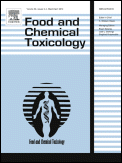
FOOD AND CHEMICAL TOXICOLOGY
Leading the way in food and chemical safety research.FOOD AND CHEMICAL TOXICOLOGY, published by Pergamon-Elsevier Science Ltd, is a prestigious journal with a significant impact in the fields of food science, medicine, and toxicology, reflecting its Q1 and Q2 quartile rankings in various categories as of 2023. Established in 1982, this journal continues to serve as an essential platform for disseminating high-quality research focused on the toxicological assessment of foods and chemicals, aiming to advance knowledge that affects public health and safety. With a pivotal role in integrating diverse disciplines, including pharmacology and agricultural sciences, the journal ranks impressively within the top percentiles—specifically 95th in Toxicology and 92nd in Food Science on the Scopus metrics. Though it operates on a traditional subscription model, the journal is committed to providing valuable insights and findings to researchers, professionals, and students across the globe, making it a vital resource in the ongoing discourse around food safety and environmental health. Its comprehensive scope underscores its importance in shaping evidence-based policies and practices.

Frontiers in Toxicology
Connecting Researchers to the Heart of ToxicologyFrontiers in Toxicology, published by Frontiers Media SA, is a prominent open-access journal dedicated to advancing the understanding of toxicological science. Established in 2019, it serves as a vital forum for innovative research, offering insights into the pharmacological impacts and toxicological profiles of various substances. With its international reach based in Switzerland, this journal has quickly ascended in the academic community, achieving a notable Q1 ranking in Pharmacology, Toxicology and Pharmaceutics (Miscellaneous) and a Q2 ranking in Toxicology as of 2023. The journal is indexed in Scopus, where it ranks #8 out of 43 in its primary category, underscoring its influence and relevance in the field. The scope encompasses cutting-edge studies on the mechanisms of toxicity, including both human and environmental impacts, making it an essential resource for researchers, professionals, and students alike. By promoting open access to high-quality research, Frontiers in Toxicology plays a crucial role in enhancing knowledge sharing and fostering collaboration across disciplines.
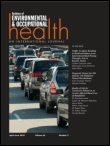
Archives of Environmental & Occupational Health
Bridging the gap between environmental science and public health.Archives of Environmental & Occupational Health is a prestigious journal published by Routledge Journals, Taylor & Francis Ltd, dedicated to advancing research and knowledge in the realms of environmental science, occupational health, and toxicology. With an ISSN of 1933-8244 and an E-ISSN of 2154-4700, this peer-reviewed journal has gained significant recognition, currently holding a Q2 ranking in Environmental Science and Q3 rankings in Health, Toxicology and Mutagenesis, and Public Health. Established in 2005, it serves as a vital platform for researchers, practitioners, and policymakers alike who aim to address and disseminate findings on pressing environmental and occupational health issues. The journal is not open access, allowing for rigorous peer review processes while still reaching a broad readership. As it converges through 2024, the Archives of Environmental & Occupational Health continues to play a critical role in shaping discourse and fostering innovation in the field, making it an essential resource for those committed to improving both human health and the environment.
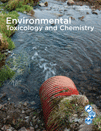
ENVIRONMENTAL TOXICOLOGY AND CHEMISTRY
Unraveling the complexities of environmental health and chemistry.ENVIRONMENTAL TOXICOLOGY AND CHEMISTRY is a premier journal published by Wiley that has established itself as an essential resource for researchers, professionals, and students in the fields of environmental chemistry and toxicology. With a robust trajectory since its inception in 1982, the journal offers critical insights into the interactions between environmental pollutants and biological systems, aiming to advance our understanding of the impacts of toxins on health and ecosystems. Recognized in the top quartile (Q1) of both Environmental Chemistry and Health, Toxicology, and Mutagenesis categories as of 2023, the journal is respected for its rigorous peer-reviewed content and high impact factor. It ranks 33rd out of 148 in Health, Toxicology and Mutagenesis and 48th out of 147 in Environmental Chemistry according to Scopus metrics, placing it firmly within the most influential publications in these fields. Although it does not currently offer open access, the journal remains a vital conduit for disseminating cutting-edge research and innovative methodologies that address pressing environmental challenges.
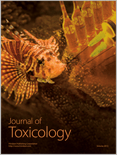
Journal of Toxicology
Unveiling the complexities of toxicology for a healthier world.Journal of Toxicology, published by HINDAWI LTD, stands as a pivotal open-access journal in the fields of toxicology and pharmacology since its inception in 2009. With an ISSN of 1687-8191 and an E-ISSN of 1687-8205, this journal is dedicated to disseminating high-quality research that critically examines the effects of toxic substances on living organisms. Located in Egypt and operating from their London office, it aims to provide an extensive platform for researchers worldwide to share findings that can inform better practices in safety and regulation. As of 2023, it has achieved significant recognition, holding a Q3 ranking in both the pharmacology and toxicology categories, and is indexed in Scopus with noteworthy percentile rankings (Toxicology: 57th and Pharmacology: 55th). With a focus on innovative studies and emerging areas such as environmental toxicology, biomarker research, and therapeutic interventions, the Journal of Toxicology invites both experienced researchers and students to contribute, thereby enhancing the breadth and depth of toxicological knowledge for the global scientific community.
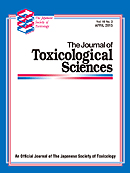
JOURNAL OF TOXICOLOGICAL SCIENCES
Exploring the Complexities of Toxic SubstancesThe Journal of Toxicological Sciences, published by the Japanese Society of Toxicological Sciences, is a prominent academic journal dedicated to the comprehensive study of toxicology and its related fields. Since its inception in 1976, the journal has provided a vital platform for researchers and professionals to disseminate innovative findings and insights in toxicology, with a focus on both experimental and clinical studies. Positioned in the Q3 quartile across various relevant categories, including Medicine (miscellaneous) and Toxicology as of 2023, the journal plays an essential role in advancing our understanding of toxic substances and their effects on biological systems. Although currently not open access, the journal maintains high academic standards and is indexed in Scopus, ranking #96 in Toxicology. Offering unique perspectives from Japan, it encourages global collaboration and discourse among toxicologists, making it an invaluable resource for students, researchers, and industry professionals alike.
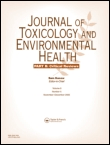
JOURNAL OF TOXICOLOGY AND ENVIRONMENTAL HEALTH-PART B-CRITICAL REVIEWS
Transforming environmental health through critical analysis.Welcome to the JOURNAL OF TOXICOLOGY AND ENVIRONMENTAL HEALTH-PART B-CRITICAL REVIEWS, a prestigious publication under TAYLOR & FRANCIS INC based in the United Kingdom. With an impressive impact factor and ranked in the Q1 category for both Health, Toxicology and Mutagenesis, and Toxicology, this journal provides critical insights into the fields of toxicology and environmental health. Since its inception in 1998, it has become a key resource for researchers, professionals, and students, offering rigorous peer-reviewed articles that synthesize and critically appraise current knowledge in the discipline. The journal is recognized globally, ranking #5 in Toxicology and #12 in Environmental Science according to Scopus, highlighting its crucial role in advancing research and understanding in these essential areas. The journal also embraces open access options, making it easier for a broader audience to access vital research findings. Engage with the latest developments and critical analyses that are shaping the future of environmental health and toxicology by exploring our comprehensive collection of reviews and articles.